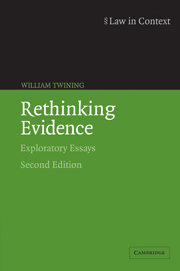
-
Select format
-
- Publisher:
- Cambridge University Press
- Publication date:
- December 2009
- June 2006
- ISBN:
- 9780511617249
- 9780521675376
- Dimensions:
- Weight & Pages:
- Dimensions:
- (228 x 152 mm)
- Weight & Pages:
- 0.77kg, 532 Pages
- Subjects:
- Law: General Interest, Socio-Legal Studies, Law, Jurisprudence
- Series:
- Law in Context
You may already have access via personal or institutional login- Subjects:
- Law: General Interest, Socio-Legal Studies, Law, Jurisprudence
- Series:
- Law in Context
Book description
The Law of Evidence has traditionally been perceived as a dry, highly technical, and mysterious subject. This book argues that problems of evidence in law are closely related to the handling of evidence in other kinds of practical decision-making and other academic disciplines, that it is closely related to common sense and that it is an interesting, lively and accessible subject. These essays develop a readable, coherent historical and theoretical perspective about problems of proof, evidence, and inferential reasoning in law. Although each essay is self-standing, they are woven together to present a sustained argument for a broad inter-disciplinary approach to evidence in litigation, in which the rules of evidence play a subordinate, though significant, role. This revised and enlarged edition includes a revised introduction, the best-known essays in the first edition, and chapters on narrative and argumentation, teaching evidence, and evidence as a multi-disciplinary subject.
Reviews
‘ … Twining seems a born teacher. His texts are highly accessible although they deal with theories that are sometimes very complicated and abstract … [I]t is not only the language that makes the text so attractive and accessible, it is also the use of examples and smart, humorous petites histoires.’
Professor Hans Nijboer Source: American Journal of Comparative Law
Contents
Metrics
Full text views
Full text views help Loading metrics...
Loading metrics...
* Views captured on Cambridge Core between #date#. This data will be updated every 24 hours.
Usage data cannot currently be displayed.
Accessibility standard: Unknown
Why this information is here
This section outlines the accessibility features of this content - including support for screen readers, full keyboard navigation and high-contrast display options. This may not be relevant for you.
Accessibility Information
Accessibility compliance for the PDF of this book is currently unknown and may be updated in the future.


